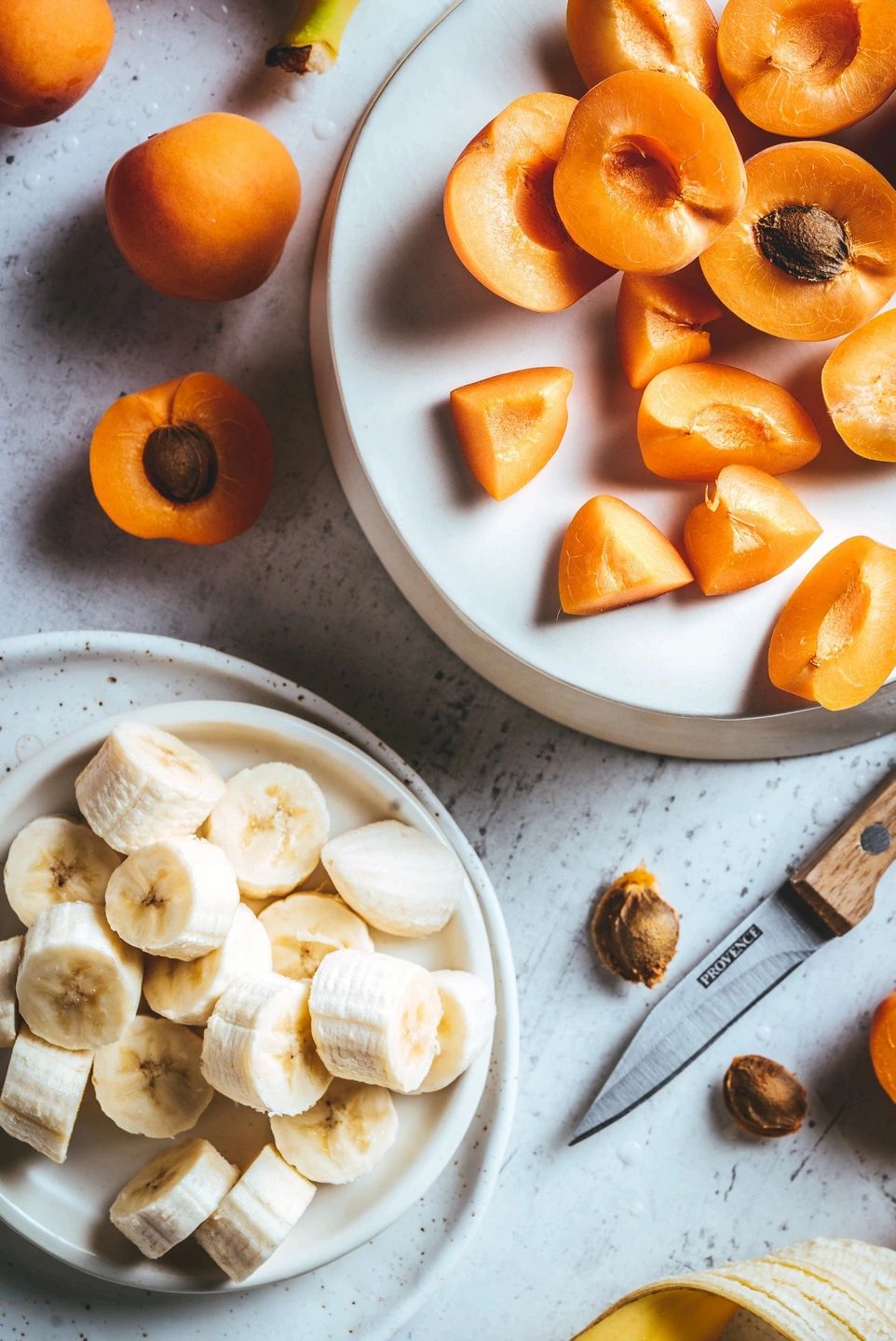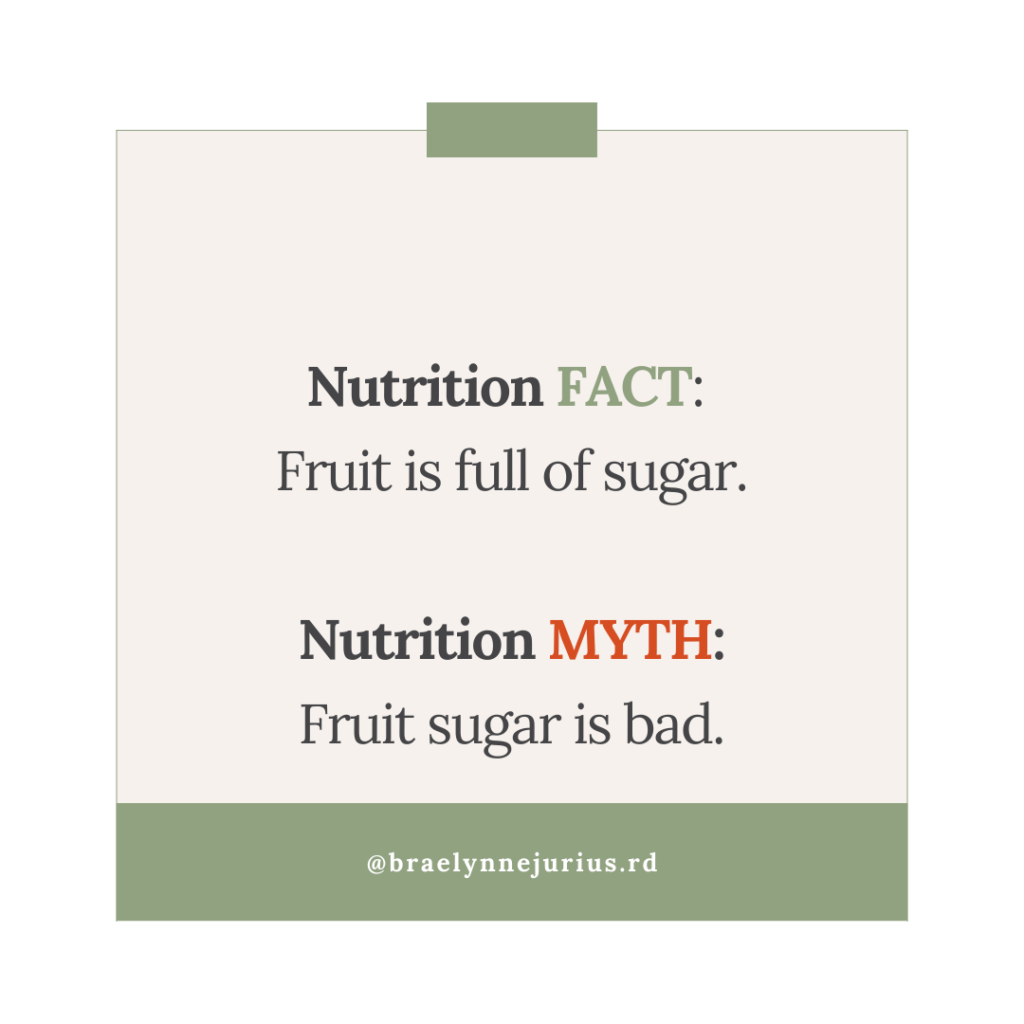Is Fruit Full of Sugar?

There was a time when I restricted fruit because I was afraid of consuming too many carbohydrates. This ultimately made me feel terrible, ruined my health for a period of time, and was unenjoyable (I love fruit!). I’m happy to say once I finally understood how the body works, I regained my health & now enjoy fruit daily again!
Ok, let’s dive into the actual science on fruit because the question I get asked daily is this: “Isn’t fruit full of sugar?” This is often asked with the perception that sugar and carbohydrates are “bad”, so if fruit has sugar, fruit must be “bad” too. While fruit does contain natural sugar, that sugar is not “bad”, it actually supports our health, nor is it really all that much sugar.
A serving of fruit contains around 15 grams of total carbohydrates (natural sugar and fiber), give or take. To give a little perspective, a 20 oz bottle of soda contains 65 grams of added sugar.
There are 3 main types of carbohydrates:
1. Simple sugars (which can be added or natural)
2. Starch
3. Fiber
Simple sugars are made up of 1 or 2 sugar molecules:
Ex. Glucose (1 sugar) + fructose (1 sugar) = sucrose (2 sugars)
Starch is made up of many sugar molecules (mainly glucose)
Ex. Glucose + glucose + glucose + glucose, etc.
Fiber is made up of many glucose molecules as well, but it’s a slightly different structure than starch & harder to break down.
These 3 types of carbohydrates are present in most foods:
🥦 Vegetables
🍎Fruits
🍞🌽 Grains & starchy vegetables (like potatoes, corn, and winter squash)
🫘Beans
🥛Dairy
🥜Nuts & seeds
Carbohydrates are also present in food in varying amounts & types.
Ex. Vegetables & fruits tend to have more fiber & simple sugars, while grains and starchy vegetables have, well, more starch.
All types of carbs will either break down into, or be converted into glucose, which our body ultimately uses for fuel. This fuel gives us:
🏃🏼♀️Energy
🧠Brain function
🏋️Muscle preservation
💁🏼♀️ Proper thyroid function (& thus metabolic health)
💩Improved digestion
🫀Heart health (fiber helps lower cholesterol)
☺️Healthy skin
💤A good night’s sleep

What makes fruit healthy?
The issue with carbohydrates is that refined or processed carbs make the breakdown process (digestion) veeery easy, which is helpful when we need quick energy (like before, during, or after physical activity), but unhelpful when we don’t (like sitting at a desk).
And with all the options for processed carbohydrates (like candy, soda, cookies, crackers, etc.), it can be easy to overdo it.
Fruit is a whole food, which, yes, has simple sugar, but it also has fiber. That fiber helps stabilize those simple sugars from spiking blood sugar too high and helps fill us up (vs. fruit juice which is just the simple sugar).
The whole food aspect & fiber also helps us from accidentally eating too much fruit. When’s the last time you accidentally ate 5 apples?? (vs. accidentally eating a whole pint of ice cream) Both have roughly the same amount of sugar. But, one is easy to overeat, and one isn’t.
And that sugar from fruit, when consumed in moderation like any other food, simply goes to fueling our bodies properly. Besides, fruit also contains vitamins, minerals, and antioxidants – all things that support our health.
How to incorporate fruit so it works better for us:
Pairing fruit with protein and/or healthy fats can make it more filling and further lower the impact it has on our blood sugar.
This is important if we’re choosing fruit as a snack on its own. Pairing it will be more likely to keep us full for longer, and keep our blood sugar stable, which helps prevent hangriness, cravings, overeating, supports even energy levels, keeps hormone levels balanced (which helps with fertility and skin health), and aids weight loss if that’s a goal.
Examples:
🍏 + sliced cheese
🫐 + yogurt
🍌 + PB
🍊 + hard boiled eggs
🍓 + protein powder (in a smoothie)
🥝 + cottage cheese
🍎 + turkey slices, jerky, or meat stick
Main takeaway
Sugar is not bad by default (no food is). It’s the amount and type that can have a positive or negative impact on our health. Too much added sugar contributes to inflammation, can supress the immune system, contributes to joint pain, and increases the risk of heart disease. A piece of fruit containing antioxidants, vitamins, minerals, fiber, and yes, sugar, supports the immune system, digestive tract, metabolic health, and is anti-inflammatory.
- Enjoy fruit daily in moderation as part of a healthy eating pattern
- Don’t fear the natural sugar it contains
- Pair it with protein/healthy fats for better blood sugar control and satiety
What’s your favorite way to enjoy fruit?? 👇
If you need help with creating a plan to support your personal nutrition needs and health goals, please schedule a discovery call for nutrition coaching!




Leave a Reply